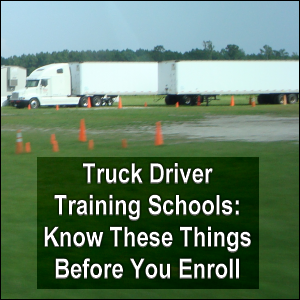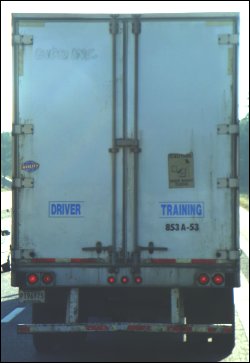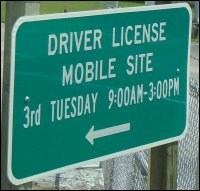Some people think that truck driving schools are limited only to truck driver training schools, the places where people first learn to drive commercial motor vehicles.
 However, honest professional drivers will tell you that the truck driver training obtained before getting one’s first truck driving job is only the beginning.
However, honest professional drivers will tell you that the truck driver training obtained before getting one’s first truck driving job is only the beginning.
No matter how long each one of us has been driving, we professional drivers learn something new on the road every day, whether
- reviewing material first studied in truck driving school,
- in the course of their daily driving,
- from other drivers,
- by means of refresher courses or classes, or
- through the school of hard knocks.
Some truckers who are unfortunate enough to receive tickets from various law enforcement jurisdictions may even required to go through a virtual driving school in order to lessen the severity of the threatened fine or points.
Let’s start with first things first…
Truck Driving Schools to Get Your First Professional Driving Job
 While we go into more detail about truck driver training schools, there are some basics that you should consider before enrolling in any truck driving school:
While we go into more detail about truck driver training schools, there are some basics that you should consider before enrolling in any truck driving school:
- pre-qualification to drive professionally (including but not limited to admission requirements);
- school licensing, accreditation and certification;
- training standards (number of hours of instruction in the classroom, actual driving time, and curriculum);
- all costs, including tuition, books, fees and penalties;
- financial aid availability;
- course length and school flexibility to meet your needs;
- transferability;
- ratios of numbers of students per teacher and students per truck;
- quality of training facilities and equipment;
- quality of teachers and trainers; and
- job placement services (upon graduation only or lifetime).
Consider that the first of your truck driving schools needs to adequately prepare you to be a successful professional driver with a long and profitable career.
The Federal Trade Commission has prepared an excellent publication entitled “Choosing a Career or Vocational School“.
Also, in the course of your investigation of truck driving schools, you may want to compare the schools’ standards against those recommended by the Professional Truck Driver Institute (PTDI).
Truck Driver Training From Your Trainer
As we describe separately, the time that a truck driving trainee under the tutelage of a truck driver trainer is very important.
Because the trainer can “make or break” one’s chances at successfully getting hired full-time by the trucking company for which he/she is employed, we have provided some assets through the Free Downloads page of our site.
Truck Driver Training Based on the Freight You Haul
Before enrolling in one or more truck driving schools, you should take a long-range view of your potential truck driving career.
 Do you have an idea about the type of truck you want to drive and the freight you want to haul?
Do you have an idea about the type of truck you want to drive and the freight you want to haul?
Each different kind of freight requires a specific type of trailer to haul it.
Consider the differences between:
- dry van;
- refrigerated van;
- flatbed;
- drop deck;
- oversized;
- tanker;
- bulk tanker;
- specialized (such as for plate glass);
- auto transporter;
- boat carrier;
- wood chip trailer; and
- other kinds of trailers.
There are pros and cons of pulling different kinds of trailers, and each requires slightly different truck driver training.
For example, if you plan to go to work for a company specializing in transporting freight on flatbed trailers, your truck driver training will most likely start with the basics, just like any other driver would receive, and then become specialized to teach you how to secure your load with straps, chains, tarp, etc.
Most of our experience has been hauling dry vans, although Mike has some experience in hauling tankers and flatbeds.
For the most part, pulling non-hazardous freight on dry vans involves no more extra effort than closing and sealing the doors, scaling the load, and hauling the shipment to the customer.
Mike made a post to The Trucker’s Report Trucker Forum(1) which Vicki edited and entitled “Pros and Cons of Pulling Various Types of Trailers” (available through our Free Downloads page.)
Truck Driver Training to Get Your CDL Endorsements
 We recommend that you do not limit your truck driving options when it comes to getting your CDL endorsements.
We recommend that you do not limit your truck driving options when it comes to getting your CDL endorsements.
Investigate the schools where you’re considering first getting your CDL, to see if they provide the truck driver training necessary to get your
– Tank Vehicle (“Tankers”) endorsement (“N”).
– Double and Triple Trailers endorsement (“T”); and
– Hazardous Materials (“Hazmat”) endorsement (“X”).
Mike reports that the last time he renewed his HazMat endorsement, he had to be fingerprinted and undergo a background check through the U.S. Department of Homeland Security.
The regional trucking company for which he drove at that time paid the cost of him to get his HazMat endorsement renewed.
Consequently, he was able to haul loads that other drivers couldn’t because they lacked both
- the knowledge of HazMat they could have gained in truck driving school and
- the HazMat endorsement.
Furthermore, there is a credential from the Transportation Security Administration called the “Transportation Worker Identification Credential” (aka “TWIC”) that some truck drivers may have to obtain to go into certain locations.
Be aware of this.
Non-Truck Driving School Refresher Courses
 From time to time, motor carriers may offer refresher courses or classes that help drivers sharpen their skills.
From time to time, motor carriers may offer refresher courses or classes that help drivers sharpen their skills.
It may be difficult for drivers to get through company terminals at the time that these non-truck driving school classes are taught, especially teams who travel all over the country.
Drivers who work for companies that put these courses on media for viewing can watch them any time they come through their home terminal.
Alternatively, some companies make these communications standard.
During the time that Mike drove for Schneider, the company produced audio tapes — under the title of “Drive Time” — which contained, among other things, helpful information including company information and non-truck driver school safety tips, hints and reminders.
Mike says that he once took a driver safety and awareness class at the headquarters of his trucking company.
We wish that larger trucking companies would put their safety materials online so that drivers who have an Internet connection can watch them any time.
Companies that are concerned about easy access of their materials by others outside the company can password protect the access and issue the access information only to employees.
Putting Your Truck Driving Skills to the Test
Do you ever wonder if all of the skills you’ve learned in your various truck driving schools makes you among the best professional truck drivers in the nation?
If so, you may be interested in the National Truck Driving Championships, a competition of professional truck drivers hosted each year by American Trucking Associations.(2)
![]() Money saving tip: If you make it your goal to learn at least one new thing every day that will help you be a better professional driver, not only will you be richer for it, but you’ll also be able to pass along words of wisdom to other drivers.
Money saving tip: If you make it your goal to learn at least one new thing every day that will help you be a better professional driver, not only will you be richer for it, but you’ll also be able to pass along words of wisdom to other drivers.
Here’s an example of a “trick of the trade” that Mike picked up from another driver: if he would scale out his loads so that the difference in the weight between the drive axles and the trailer axles is 500 pounds or less, his load would pull better.
Mike says that this works uniquely with a Mercedes engine, but perhaps this will benefit other drivers, too.
It may not be apparent at first, but drivers who haul loads in rigs that are set to “buck” less will have less strain on their backs, which could prevent problems later on (like time off work due to back problems, multiple trips to the chiropractor, back surgery, etc.).
Return from Truck Driving Schools and Truck Driver Training: A Guide to our Truck Driver Training Schools page or our Truck Drivers Money Saving Tips home page.
References
1. http://www.thetruckersreport.com/truckingindustryforum/
2. http://www.truckline.com/programs/NTDC/Pages/default.aspx

















